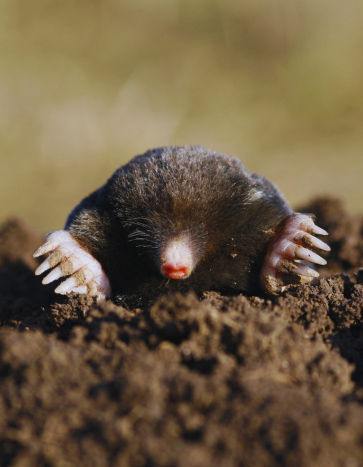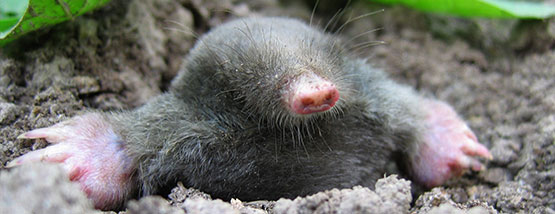
WHY CONTROL MOLES?
Even during Iowa’s cold months, moles stay active underground, tunneling beneath frozen soil and setting the stage for major spring damage.
Their hidden activity can weaken lawns, shift soil under structures, and create hazards for people and pets. Acting now prevents the problem from growing unseen through winter.
1. Protect Your Lawn and Garden
Moles stay active beneath frozen soil, tearing through root systems and creating soft spots that appear when snow melts. Our mole control services stop winter tunneling early to prevent lasting lawn damage.
2. Prevent Structural Issues
Tunnels under patios, driveways, or foundations weaken soil and worsen with freeze–thaw shifts. Scheduling winter mole removal now keeps your property stable and avoids costly repairs later.
3. Preserve Your Landscaping Investment
Hidden tunnels create trip hazards under snow and attract wildlife that carry disease. Our targeted mole control keeps your yard safer for family and pets all winter.
MOLE CONTROL SERVICES
Seeing new tunnels or mounds even in cold weather? Moles remain active under frozen soil, and their tunnels can expand before spring arrives.
That’s why we use proven, humane methods to stop mole damage safely and effectively.
OUR MOLE CONTROL PROCESS
At Bobcat Wildlife & Pest Management, we use careful inspections, humane removal, and preventive solutions to stop moles at the source.
Each step is done with precision to keep your property protected—even through Iowa’s winter months. Schedule Service today to safeguard your yard before spring.
DEALING WITH MORE THAN JUST MOLES?
If other pests are giving you trouble this season, we can help.
🦝 All-Inclusive Wildlife Management
From raccoons in the trash to squirrels in the attic, our team handles all types of wildlife safely. We use humane relocation methods that protect your property and the animals.
🐜 Advanced Insect Control
Dealing with ants, termites, or other insects? Our targeted treatments eliminate infestations fast and prevent them from coming back.
🐀 Comprehensive Rodent Control
Our proven techniques remove mice and rats quickly and keep them from returning. We also provide effective mole and vole control for complete yard protection.
At Bobcat Wildlife & Pest Management, we offer full-service pest and wildlife solutions to keep your home protected year-round.
Schedule Service today to solve any pest issue before it spreads.
HOW TO SPOT MOLE ACTIVITY

Detecting mole activity early helps prevent serious lawn and soil damage—especially in winter when tunnels often go unnoticed under frozen ground. Watch for these signs around your yard:
1. Raised Ridges and Molehills
Look for raised lines across your lawn or fresh mounds of loose soil. These ridges and molehills mark active tunneling below the surface.
2. Damaged Plant Roots
Plants that wilt or die without a visible cause may have roots disturbed by mole activity. Moles often disrupt root systems while searching for insects.
3. Soft, Spongy Ground
Step carefully across your lawn—areas that feel soft or uneven may indicate extensive underground tunnels weakening the soil.
Spotting these early helps you act before thaw season makes the damage worse.
MAIN ISSUES
Frequently Asked Questions
Why Choose Bobcat Wildlife & Pest Control
Bobcat Wildlife and Pest installed Incide PC™ insulation in our attic space. They were quick, quiet, and did a great job. Our home is warmer and more comfortable now. Well worth it!
Highly recommend this group!!! Within 24 hours of my “something stinks” panic call, one of the techs, Ronnie, was at our place taking care of the animals that found their final resting place in our vents… and patched it up so we wouldn’t have this happen again. On-time, efficient, and very knowledgeable!!
I just wanted to email and let someone know how nice of a job Jared does when he comes out to treat the house. He always asks how things are and if I have any concerns. He checks things thoroughly each visit and addresses issues that need taken care of. He is very pleasant and professional.
If you are looking for someone who does a great job, is thorough, is dedicated to making your home a priority-Bobcat Wildlife & Pest Management is you’re only source for pest management. Best of the Best!
Bobcat Wildlife & Pest were very helpful. They were prompt and went over and above in their service to us. We will definitely recommend them to our family and friends.
Our office is next to a restaurant so pest control is a constant battle. Bobcat Wildlife & Pest Management were discreet and efficient. We have not seen any pests since working with them.
We had a pest problem and the entire team was very responsive! From the phone staff to Ronnie coming out to the property. He was very helpful in explaining our issue and how we were going to treat it. Thank you!


